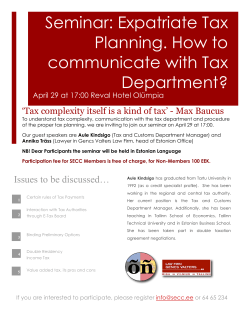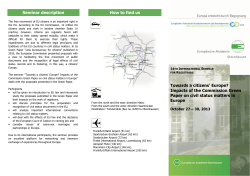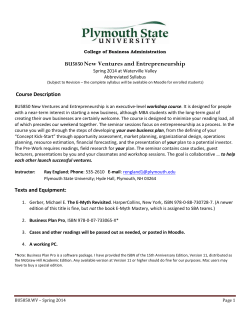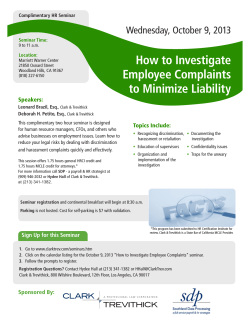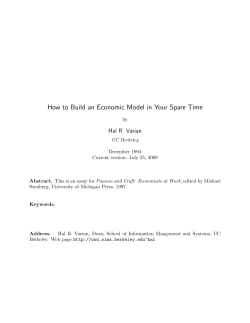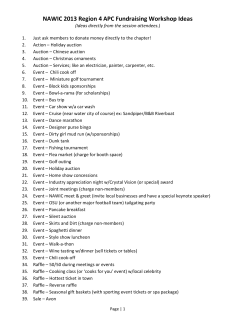
Current topics in strategy and international management ‐ Carnegie perspective on behavioral strategy and
Department of Business Administration University of Zurich Professor Thomas Keil, D.Sc.(Tech.) Chair in International Management Currenttopicsinstrategyand internationalmanagement‐Carnegie perspectiveonbehavioralstrategyand itsapplications Overview The course introduces doctoral students to recent topics in strategy and international management. This fall the theme of the course is the Carnegie perspective on behavioral strategy and its applications to contemporary strategic management. The course will consist of independent reading of selected articles, 3 seminar days (including student presentations on articles), 3 short essays (1‐2 pages) reflecting the readings and open research issues of each seminar day, the opportunity to present student’s own research related to the behavioral strategy and a short course paper (roughly 5 pages). After the course, the participant should (1) be familiar with current trends in the literature in strategy and international management, in particular the Behavioral Theory of the Firm and (2) be able to connect their work to the Behavioral theory of the Firm. Dates and rooms: The dates for the seminar are Seminar day 1: Tuesday October 21, 2014 9:00‐17:00 Seminar day 2: Wednesday October 22, 2014 9:00‐17:00 Seminar day 3: Thursday October 23, 2014 9:00‐17:00 Seminar days will run from 9 to 17 o’clock with a short 30 min lunch break. Instructor: Professor Thomas Keil, Chair of International Management, University of Zurich and Dr Pasi Kuusela. Should you have any questions about the course, please feel free to contact Dr Kuusela at pasi.kuusela(at)business.uzh.ch. Target audience: The seminar is designed for doctoral students in business administration with strong interest in strategy and international management, which have successfully passed at least one course in general strategy and/or general international business at bachelor or master level. Page 1/7 Department of Business Administration Given the format and the requirements of this seminar, experience has shown that lack of pre‐existing knowledge of the mentioned topics will affect the ability to understand the articles, the class discussions and possibly prevent the successful completion of the seminar. If space permits, it is open to students from other departments. Credits: The course is of 3 credits extent. Enrollment: Please register in advance by sending email to thomas.keil(at)business.uzh.ch before October 1, 2014. Briefly state your background (year of studies, preliminary topic of thesis, name of the professor who supervises your thesis), study transcript to assess required pre‐existing knowledge, and motivation/expectations to take this course. Passing the course: Passing the course requires • reading and presenting of the assigned articles and active participation in the seminar sessions (showing up with no understanding of the readings does not qualify as attendance) • three short reflective essays on the contents of the seminar day • writing a short course paper (roughly 5 pages) on one of the seminar day topics Participation and presenting of assigned articles: Participation in all seminar days is mandatory and a maximum absence of one single half day block (morning to lunch OR lunch to end of the day) will be accepted. Participants must arrive in time or enter or leave the seminar at the breaks, to avoid disturbing an ongoing session. Absences, possible delays or other challenges must be communicated to Prof. Keil before or after each seminar day via email, to allow tracking of the communication and possible absences. Please avoid informing in person at the seminar days. During each day, about 8 articles will be discussed. All participants are expected to read the full set of articles (which will be send to all participants in early October) before the seminar day. In addition, for every seminar day each participant will be assigned 2‐4 articles for facilitation. The facilitation role involves a short summary presentation of the article content as facilitating the discussion for instance through questions. You can build your presentation on the assumption that everyone has already read all the papers. Your presentation can shortly state the main argument of the paper and, for instance, address issues such as what do you consider the main contribution of the paper, are you willing to buy the argument the paper makes (why or why not?), is the chosen empirical approach appropriate, what do you see as the main strengths and weaknesses of the paper, and how do you see its connections to other literature. Summary presentations will be max 10 minutes per article followed by discussion. Please, submit your presentations (1 or more articles as assigned) to Prof. Keil one day before the session no later than 1 pm. Page 2/7 Department of Business Administration Reflective essays: For each seminar day students are required to prepare a reflective essay on the readings of seminar day. The essays should focus on key contributions of the readings and open issues for future research based upon the students own reading (not simply restating the future research section). Essays should be 1‐2 pages single spaced in length. Please, submit your essay to Prof. Keil at latest Friday 10th of October 2014. Presentation of own research work: Students will have the opportunity to present research of their own that is related to the Behavioral theory of the Firm on the last seminar day. Students that wish to take this opportunity need to inform the instructor during the enrollment and submit a full paper for distribution among participants by Friday 10th of October 2014. Course paper: Participants are expected to prepare a short course paper on a topic related to behavioral theory of the firm research stream, and initiated by the participant during/after the seminar. Papers already under work at the seminar start are not accepted. The paper should sketch out an idea for a journal article and take the format of a journal article introduction, specifying a gap in the literature and outlining a theoretical and empirical approach to address this gap. The expected length is about 4‐5 pages plus references. Students will receive feedback how to develop the course paper into a full length article. The paper is due on 1st of December, 2014. Please note that no late submissions will be accepted. Grading the Course: The course will be graded on a pass/fail basis. To pass the course all three components mentioned above need to receive a grade of pass. Page 3/7 Department of Business Administration Readings Required readings are compulsory to read before each session as the discussion is based on the papers. We expect that you have read the paper and formed an opinion of its contents. Optional readings are not compulsory but help to deepen your understanding. You might want to take a look on these if you have extra time and interest on the specific topic, and like to find out what recent research has been done in the domain. Recommended reading order for compulsory readings is as listed in this syllabus (chronological). Preliminary reading list (subject to change, final list will be announced after 1st of October): Day 1 Classical Carnegie Simon HA. 1947. Administrative Behavior. Free Press: New York, Chapters 4‐5 Simon, HA. 1955. A Behavioral Model of Rational Choice. Quarterly Journal of Economics, 69(1): 99‐ 118. Simon, HA. 1956. Rational Choice and the Structure of the Environment. Psychological Review, 63(2): 129‐138. March JG, Simon HA. 1958. Organizations. Wiley: New York, Chapter 6: Cognitive Limits on Rationality Simon, HA. 1962. The Architecture of Complexity. Proceedings of the American Philosophical Society, 106(6): 467‐482. Cyert, RM, March, JG. 1963. A behavioral theory of the firm, 2nd edition (1992), Blackwell: Oxford UK, Chapter 7: A Summary of Basic Concepts in the Behavioral Theory of the firm Cohen, MD., March, JG., & Olsen, JP. 1972. A Garbage Can Model of Organizational Choice. Administrative Science Quarterly, 17(1): 1‐25. Levinthal, DA. & March, JG. 1981. A Model of Adaptive Organizational Search. Journal of Economic Behavior & Organization, 2(4): 307‐333. March, JG. 1991. Exploration and Exploitation in Organizational Learning. Organization Science, 2(1): 71‐78. Optional readings: Gavetti G, Greve HR, Levinthal DA, Ocasio W. 2012. The Behavioral Theory of the Firm: Assessment and Prospects. Academy of Management Annals 6: 1‐40 Simon, HA., 1964. On the concept of organizational goal. Administrative Science Quarterly 1–22. March, JG. & Simon, HA., 1958. Organizations. John Wiley & Sons Inc. Chapter 5 Conflict in Organizations. Cyert, RM., March, JG., 1963. A behavioral theory of the firm. Prentice Hall, Englewood Cliffs, New Jersey. Chapter 3 Organizational Goals. Page 4/7 Department of Business Administration Day 2‐3 Neo‐Carnegie and beyond Complexity, Search, and Adaptation Siggelkow, N. & Levinthal, D. A. 2003. Temporarily Divide to Conquer: Centralized, Decentralized, and Reintegrated Organizational Approaches to Exploration and Adaptation. Organization Science, 14(6): 650‐669. Levinthal, D. A. & Posen, H. E. 2007. Myopia of Selection: Does Organizational Adaptation Limit the Efficacy of Population Selection? Administrative Science Quarterly, 52(4): 586‐620. Lazer, D. & Friedman, A. 2007. The Network Structure of Exploration and Exploitation. Administrative Science Quarterly, 52(4): 667‐694. Billinger, S., Stieglitz, N., Schumacher, T.R., 2013. Search on Rugged Landscapes: An Experimental Study. Organization Science 25, 93–108. doi:10.1287/orsc.2013.0829 Knudsen, T. & Srikanth, K. 2014. Coordinated Exploration: Organizing Joint Search by Multiple Specialists to Overcome Mutual Confusion and Joint Myopia. Administrative Science Quarterly, 59(3): 409‐441. Optional readings: Piezunka, H., Dahlander, L., 2014. Distant Search, Narrow Attention: How Crowding Alters Organizations’ Filtering of Suggestions in Crowdsourcing. Academy of Management Journal amj.2012.0458. doi:10.5465/amj.2012.0458 Baumann O, Siggelkow N. 2013. Dealing with Complexity: Integrated Vs. Chunky Search Processes. Organization Science 24(1): 116‐132 Aspirations & Performance feedback Greve, H. R. (1998). Performance, Aspirations, and Risky Organizational Change. Administrative Science Quarterly, 43(1), 58–86. Audia, P. G., & Greve, H. R. (2006). Less likely to fail: Low performance, firm size, and factory expansion in the shipbuilding industry. Management Science, 52(1), 83. Arrfelt, M., Wiseman, R.M., Tomas M. Hult, G., 2013. Looking Backward Instead of Forward: Aspiration‐Driven Influences on the Efficiency of the Capital Allocation Process. Academy of Management Journal 56, 1081–1103. doi:10.5465/amj.2010.0879 Kim, J.Y, Finkelstein, S.; Haleblian, J. (2014). All aspirations are not created equal: the differential effects of historical and social aspirations on acquisition behavior. Academy of Management Journal, in print. Optional readings: Shinkle, G. A. (2012). Organizational Aspirations, Reference Points, and Goals: Building on the Past and Aiming for the Future. Journal of Management, 38(1), 415–455. Page 5/7 Department of Business Administration Blettner, D.P., He, Z.‐L., Hu, S., Bettis, R.A., 2014. Adaptive aspirations and performance heterogeneity: Attention allocation among multiple reference points. Strategic Management Journal. n/a–n/a. doi:10.1002/smj.2260 Bromiley, P., Harris, J.D., 2014. A comparison of alternative measures of organizational aspirations. Strategic Management Journal. 35, 338–357. doi:10.1002/smj.2191 Lim, E.N.K., McCann, B.T., 2013. Performance Feedback and Firm Risk Taking: The Moderating Effects of CEO and Outside Director Stock Options. Organization Science. doi:10.1287/orsc.2013.0830 Moliterno, T.P., Beck, N., Beckman, C.M., Meyer, M., 2014. Knowing Your Place: Social Performance Feedback in Good Times and Bad Times. Organization Science. doi:10.1287/orsc.2014.0923 Gaba, V., Joseph, J., 2013. Corporate Structure and Performance Feedback: Aspirations and Adaptation in M‐Form Firms. Organization Science 24, 1102–1119. doi:10.1287/orsc.1120.0788 Learning Baum JAC, Li SX, Usher JM. 2000. Making the Next Move: How Experiential and Vicarious Learning Shape the Locations of Chains' Acquisitions. Administrative Science Quarterly 45(4): 766‐801 Haunschild PR, Ni Sullivan B. 2002. Learning from Complexity: Effects of Prior Accidents and Incidents on Airlines' Learning. Administrative Science Quarterly 47(4): 609‐643 Denrell, J., Fang, C., & Levinthal, D. A. 2004. From T‐Mazes to Labyrinths: Learning from Model‐ Based Feedback. Management Science, 50(10): 1366‐1378. Perkins, S. E. 2014. When Does Prior Experience Pay? Institutional Experience and the Multinational Corporation. Administrative Science Quarterly, 59(1): 145‐181. Desai, V., 2014. Learning through the Distribution of Failures within an Organization: Evidence from Heart Bypass Surgery Performance. Academy of Management Journal. amj.2013.0949. doi:10.5465/amj.2013.0949 Optional readings: Castellaneta, F., Zollo, M., 2014. The Dimensions of Experiential Learning in the Management of Activity Load. Organization Science. doi:10.1287/orsc.2014.0906 Ghosh, A., Martin, X., Pennings, J.M., Wezel, F.C., 2013. Ambition Is Nothing Without Focus: Compensating for Negative Transfer of Experience in R&D. Organization Science 25, 572–590. doi:10.1287/orsc.2013.0845 Cognition & Attention Ocasio W. 1997. Towards an Attention‐Based View of the Firm. Strategic Management Journal 18: 187‐206 Gavetti G. 2005. Cognition and Hierarchy: Rethinking the Microfoundations of Capabilities' Development. Organization Science 16(6): 599‐617 Page 6/7 Department of Business Administration Gary, M. S. & Wood, R. E. 2011. Mental Models, Decision Rules, and Performance Heterogeneity. Strategic Management Journal, 32(6): 569‐594. Maula MVJ, Keil T, Zahra S. 2013. Top Management's Attention to Discontinuous Technological Change: Corporate Venture Capital as an Alert Mechanism. Organization Science 24(3): 926‐947 Optional readings: Kaplan S. 2011. Research in Cognition and Strategy: Reflections on Two Decades of Progress and a Look to the Future. Journal of Management Studies 48(3): 665‐695 Haas, M.R., Criscuolo, P., George, G., 2014. Which Problems to Solve? Attention Allocation and Online Knowledge Sharing In Organizations. ACAD MANAGE J amj.2013.0263. doi:10.5465/amj.2013.0263 Li, Q., Maggitti, P., Smith, K., Tesluk, P., Katila, R., 2012. Top management attention to innovation: The role of search selection and intensity in new product introductions. ACAD MANAGE J. doi:10.5465/amj.2010.0844 Crilly, D., Sloan, P., 2013. Autonomy or Control? Organizational Architecture and Corporate Attention to Stakeholders. Organization Science 25, 339–355. doi:10.1287/orsc.2013.0849 Ocasio W. 2011. Attention to Attention. Organization Science 22(5): 1286‐1296 Joseph J, Ocasio W. 2012. Architecture, Attention, and Adaptation in the Multibusiness Firm: General Electric from 1951 to 2001. Strategic Management Journal 33(6): 633‐660 Page 7/7
© Copyright 2025

